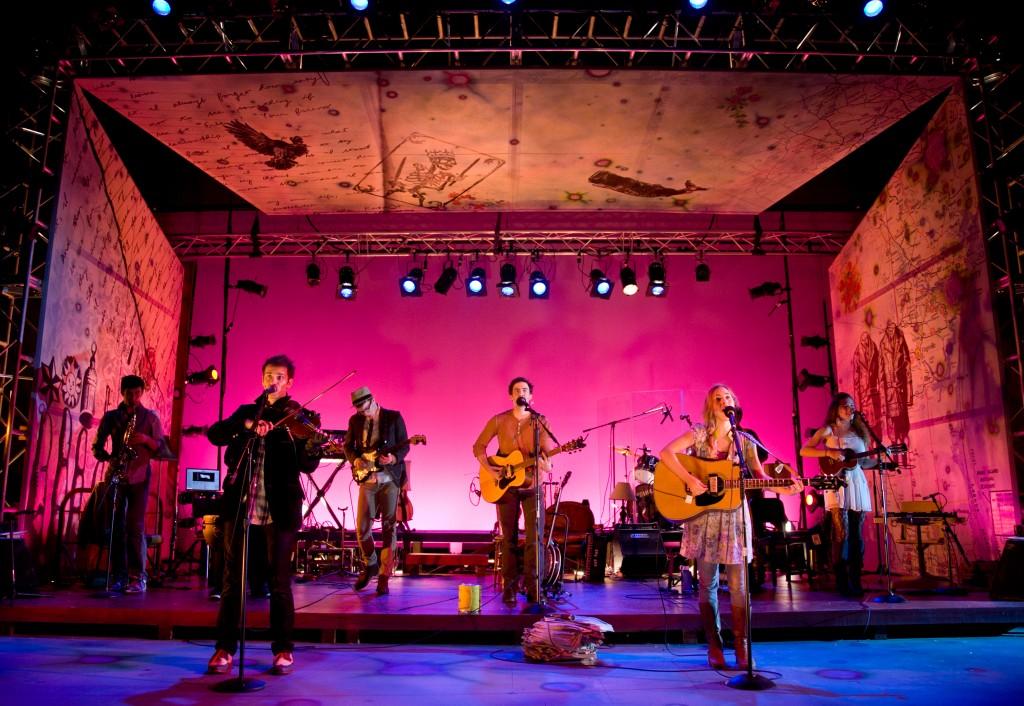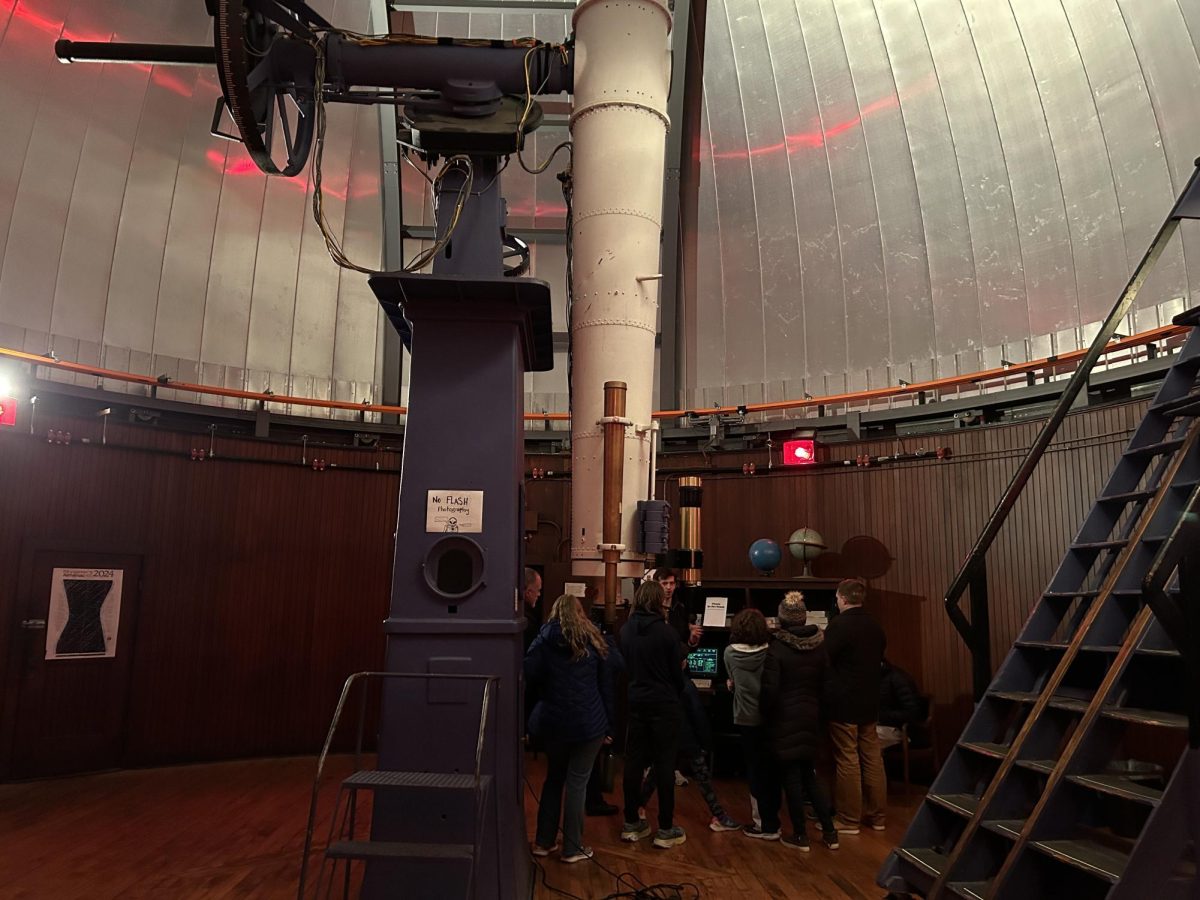A modern spin on one of Shakespeare’s classics, “The Verona Project” delves into themes of love, loss and self-discovery, featuring a unique fusion of acting and live music.
The show, originally conceived as a novella, is written and directed by Amanda Dehnert and was first performed at the California Shakespeare Theater, drawing an enthusiastic response that inspired a similar production at Northwestern. It’s a fresh take on Shakespeare’s “The Two Gentlemen of Verona,” in which a group of friends embark on separate journeys of personal transformation and become entangled in complicated love triangles along the way.
Communication senior Zach Sorrow, who plays Sylvio, described “The Verona Project” as a “rock concert, storytelling, music-experience thing.”
“The Verona Project” functions as both the title of the play and the name of the musical ensemble in which cast members perform. They each take on dual roles, portraying themselves as band members and the characters whose story they’re telling.
“We are a band who wrote these songs and have a storyline that’s important to us that goes through the songs that we wrote,” said Communication sophomore Michelle Schecter, who plays Thuria.
Sorrow said he enjoyed the originality of the show’s format, which features actors transforming into character roles on stage while simultaneously playing musical instruments. Prior to “The Verona Project,” some cast members learned to play new instruments specifically for the production.
“It doesn’t really fit anywhere within musical theater, and it doesn’t fit as a play,” Sorrow said of the show’s complicated genre.
“The Verona Project” feature Proteus and Valentine, two friends living in the town of True. Julia, the town’s only girl, befriends them in an attempt to be a part of their group and ends up falling in love with Proteus.
“She’s a thinker, constantly thinking things through, thinking them out loud,” said Communication junior Madeline Weinstein of her character, Julia. “Some people can’t follow her train of thought. She’s positive that if people knew her secrets they’d reject her. She labels herself a freak show. She doesn’t realize how strong she is. She has an incredible amount of strength but she’s also sensitive.”
Weinstein also said the show takes on the issue of coming into one’s own. After falling in love with Proteus, Julia later finds she needs to learn how to be an individual outside of their relationship.
“I think it’s an important takeaway for anyone in a serious relationship, navigating that difficult terrain of trying to be yourself first before being with another person,” Weinstein said.
Largely because of the relationship that develops between Proteus and Julia, Valentine begins to feel like a third wheel and sets out for a new city in which to find himself. While there, he falls in love with Sylvio. To complicate matters, Sylvio is betrothed to Thuria.
“Sylvio is the son of the duke and has a sort of image that he has to uphold for himself and his family,” Sorrow said. “He falls in love, which is absolutely not OK, so that’s a fundamental issue for him.”
Even when Sylvio’s fiancee Thuria becomes aware of Sylvio and Valentine’s romance, she continues to stand by, coolly observing as an outsider looking in.
“There’s this moment where she sees Valentine and Sylvio embrace and she turns to the audience and she explicitly tells them that she’s not mad,” Schechter said. “She’s happy for him; she just prefers other stories than her own sometimes.”
The character of Time, played by Communication senior Patrick Budde, watches the action and provides musical underscoring.
“Every once in a while, I will butt in to talk about why this moment had to end because this next thing had to happen,” Budde said. “I do get a kick out of putting characteristics to more abstract concepts like ‘What does Time sound like?’ ‘What does Time find funny?’ ‘What does Time find tragic?'”
He said, as is common in real life, not everyone responds well to changes over time.
“There are one or two moments where two characters are trying to make a plan, trying to figure out what to do next,” Budde said. “They don’t have much time and they sort of look to me for the time to do what they need to do. I basically say nope, sorry, sucks to be you (but) let’s keep going. … That’s part of the way time works. Time’s kind of a bitch.”
Music is used throughout “The Verona Project” to help show the passage of time and emphasize the passionate moments. It’s the emotional current that makes the show so special, Schechter said.
Although “The Verona Project” centers around youthful journeys of self-discovery, its messages apply to audience members of all ages.
“It really is cool because a lot of times when I see theater, the parts about people dying or falling in love is what I’m interested in,” Schechter said. “But in this show, that’s all there is. So it’s filled with things that everyone feels and everyone thinks and no one has the courage to kind of say. And I find myself affected by it every time I hear the show. It’s just so important and real and beautiful.”
“The Verona Project” opened at Northwestern’s Josephine Louis Theater on Oct. 19 and will run on weekends through Nov. 4.







